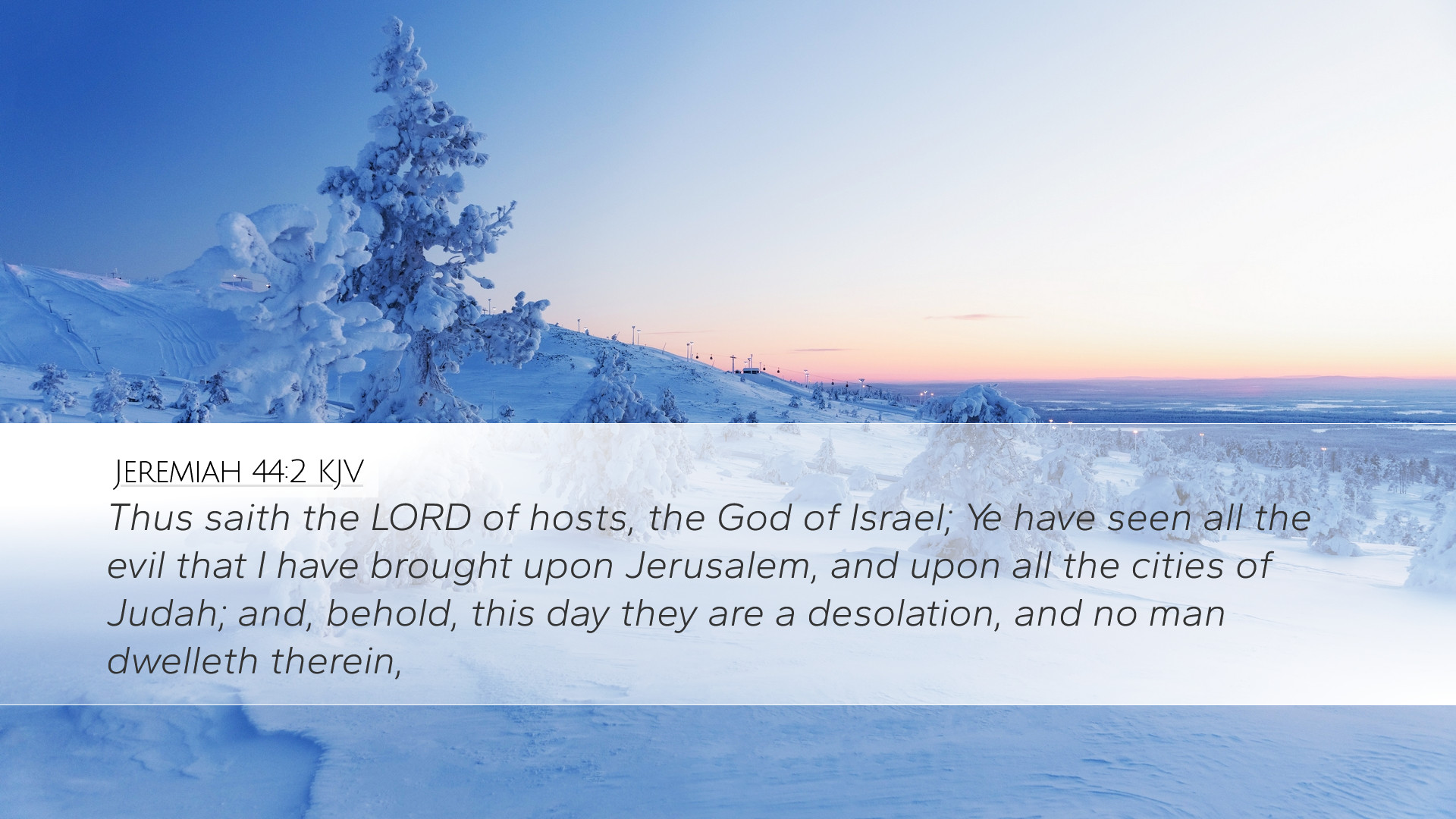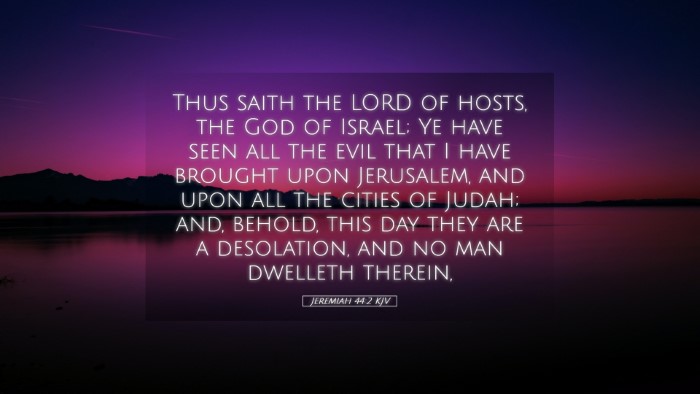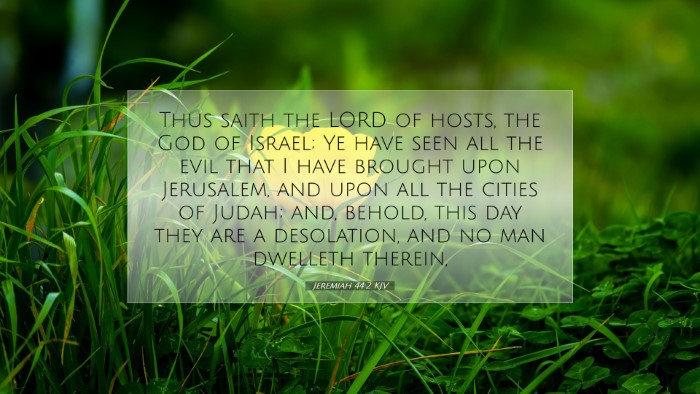Commentary on Jeremiah 44:2
Introduction
Jeremiah 44:2 serves as a pivotal passage within the book of Jeremiah, providing insight into the responses of the Jewish people residing in Egypt during the Babylonian exile. This commentary synthesizes the insights of notable public domain commentaries, including those by Matthew Henry, Albert Barnes, and Adam Clarke, to offer a comprehensive perspective on its theological and historical implications.
Verse Overview
Jeremiah 44:2 states: “Thus saith the LORD of hosts, the God of Israel; Ye have seen all the evil that I have brought upon Jerusalem, and upon all the cities of Judah; and, behold, this day they are a desolation, and no man dwelleth therein.”
The Context of the Verses
The context of this verse is essential to understanding its meaning. Following the destruction of Jerusalem in 586 B.C., many of the surviving Jews fled to Egypt seeking refuge. In this chapter, God speaks to these exiles, reaffirming His sovereignty and the consequences of their disobedience. The commentary provides a deeper examination of why these events unfolded and the spiritual ramifications they hold.
1. Historical Background
Albert Barnes emphasizes that the message in Jeremiah 44:2 comes with an urgent reminder of God’s past actions—namely, the calamity that befell Jerusalem and Judah due to their persistent idolatry. The Israelites had witnessed firsthand the devastating outcomes of turning away from God, a reality that should have incited repentance.
2. God’s Sovereignty and Judgment
Matthew Henry observes the declaration "Thus saith the LORD" as a critical aspect, indicating that the message is not merely a human thought but a divine proclamation. This reaffirms God's authority in delivering judgment and the seriousness of the situation faced by the exiles in Egypt.
3. The Condition of Jerusalem
Adam Clarke highlights the state of Jerusalem as a "desolation," which would have been a painful reality for these exiles. The consciousness of their homeland's ruin calls for reflection on their state of being and loyalty to God—a call that they ultimately rejected, as seen in their ongoing propensity toward idolatry.
Theological Implications
The theological implications of Jeremiah 44:2 are far-reaching. The verse articulates a vivid reminder of God’s judgment, which is a central theme in the prophets. It serves as a cautionary tale for all believers, showcasing the consequences of turning away from God’s commands.
1. The Reality of Sin and Judgment
In his reflections, Barnes brings to light the inevitability of facing the consequences of sin. The verse echoes the broader biblical narrative where judgment follows disobedience—a theme that is relevant for pastors and theologians addressing the reality of sin in contemporary contexts.
2. Call to Repentance
Henry underscores that this message was intended to provoke a spirit of repentance among the exiles. Recognizing the ruin around them should have led them to turn back to God, highlighting the perpetual need for humility and contrition before God in the face of His judgments.
3. The Nature of God’s Promises
Clarke argues that God’s declaration serves to reaffirm the promises he made concerning Israel’s fate. Even in judgment, there lies the potential for restoration, a core theme in the prophetic literature that pastors are urged to communicate to their congregations—God’s readiness to forgive and restore those who genuinely repent.
Applications for Today
This passage presents various applications for modern readers, reminding believers of the dire consequences of idolatry and the importance of fidelity to God. The insights from Henry, Barnes, and Clarke lead to important themes for reflection and teaching.
1. A Call to Faithfulness
Just as the exiles faced the devastation of their choices, today's believers are reminded to evaluate their faithfulness to God amidst competing influences. The call remains to prioritize a relationship with God over worldly distractions.
2. Recognizing God’s Work in History
Henry encourages an acknowledgment of God's continual presence and involvement in the lives of His people. Past experiences of faith, whether of blessing or judgment, should inform current practices and beliefs, particularly in community worship.
3. Cultivating a Spirit of Humility
Barnes suggests that the acknowledgment of one’s faults leads to spiritual maturity. As individuals and as a church, fostering a humble approach to God is essential in seeking His guidance and mercy.
Conclusion
Jeremiah 44:2 encapsulates a poignant moment in Israel’s history, serving as a critical reminder of God's sovereignty and the consequences of neglecting His commandments. By engaging with the insights from prominent commentaries, pastors, students, and theologians can embrace the lasting teachings of scripture. Jeremiah's message continues to resonate, urging every believer towards faithfulness, humility, and the pursuit of a restorative relationship with God.


